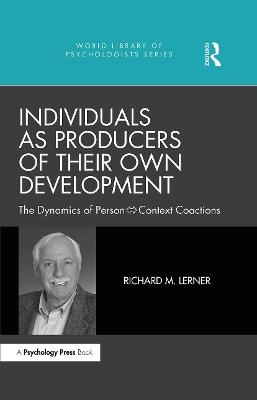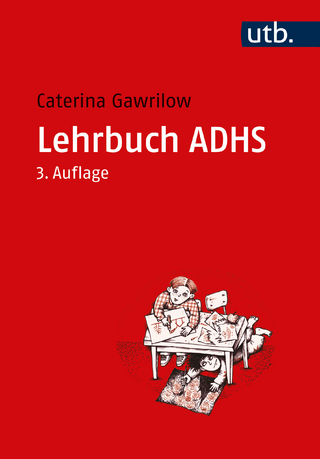
Individuals as Producers of Their Own Development
Routledge (Verlag)
978-0-367-54463-8 (ISBN)
In the World Library of Psychologists series, international experts present career-long collections of what they judge to be their most interesting publications—extracts from books, key articles, research findings, and practical and theoretical contributions.
Professor Richard M. Lerner has been prominent in the application of developmental science across the life span for half a century, investigating dynamic, relational development systems, and their potential impact on positive youth development (PYD) and social justice. In this collection, Professor Lerner presents the development of his theory of, and research about, relations between life-span human development and contextual or ecological change, exploring the mutually influential relations between humans and their peer, family, school, and community contexts.
Including a specially written introduction, in which Professor Lerner reflects on the importance of mentorship and contextualises both the field and the evolution of his wide-ranging career, this collection will be a valuable resource for students and researchers of developmental psychology.
Richard M. Lerner is the Bergstrom Chair in Applied Developmental Science and the Director of the Institute for Applied Research in Youth Development in the Eliot Pearson Department of Child Study and Human Development, at Tufts University. He has authored more than 700 scholarly publications, including more than 80 authored or edited books, and was founding editor of the Journal of Research on Adolescence and of Applied Developmental Science. His honors include the American Psychological Association’s (Division 7) Urie Bronfenbrenner Award for Lifetime Contribution to Developmental Psychology in the Service of Science and Society, 2013; the Society for Research in Child Development Award for Distinguished Contributions to Public Policy & Practice in Child Development, 2017, and the International Society for the Study of Behavioral Development Award for Applications of Behavioral Development Theory and Research, 2018.
Part I. Introduction: Development As Individual Context Relations Across Time and Place Part II. Empirical Beginnings Lerner, R. M., & Korn, S. J. (1972). The development of body-build stereotypes in males. Lerner, R. M., & Lerner, J. V. (1977). Effects of age, sex, and physical attractiveness on child-peer relations, academic performance, and elementary school adjustment. Part III. The Evolution of Dynamic, Relational Developmental Systems-Based Models Lerner, R. M. (1978). Nature, nurture, and dynamic interactionism. Lerner, R. M. (1982). Children and adolescents as producers of their own development. Lerner, R. M. (1991). Changing organism–context relations as the basic process of development: A developmental contextual perspective. Lerner, R. M. (1996). Relative plasticity, integration, temporality, and diversity in human development: A developmental contextual perspective about theory, process, and method. Lerner, R. M., Agans, J. P., DeSouza, L. M., & Hershberg, R. M. (2014). Developmental science in 2025: A predictive review. Lerner, R. M., Lerner, J. V., & Chase, P. A. (2019). Toward enhancing the role of idiographic-based analyses in describing, explaining, and optimizing the study of human development: The sample case of adolescent family relationships. Part IV. Theory-Predicated Applications of Developmental Science and the Positive Youth Development Perspective Lerner, R. M., Fisher, C. B., & Weinberg, R. A. (2000). Toward a science for and of the people: Promoting civil society through the application of developmental science. Lerner, R. M., Fisher, C. B., & Weinberg, R. A. (2000). Applying developmental science in the 21st century: International scholarship for our times. Jelicic, H., Bobek, D. L., Phelps, E., Lerner, R.M., & Lerner, J. V. (2007). Using positive youth development to predict contribution and risk behaviors in early adolescence: Findings from the first two waves of the 4-H Study of Positive Youth Development. Lerner, R. M., Tirrell, J. M., Dowling, E. M., Geldhof, J., Gestsdóttir, S., Lerner, J. V., King, P. E., Williams, K., Iraheta, G., & Sim, A. T. R. (2018). The end of the beginning: Evidence and absences studying PYD in a global context. Lerner, R. M. (2018). Character development among youth: Linking lives in time and place. Part V. Exposing the Counterfactual Nature of Genetic Reductionism Lerner, R. M., & von Eye, A. (1992). Sociobiology and human development: Arguments and evidence. Lerner, R. M. (2015). Eliminating genetic reductionism from developmental science. Lerner, R. M. (2016). Complexity embraced and complexity reduced: A tale of two approaches to human development: Commentary on Witherington and Lickliter. Lerner, R. M., & Overton, W. F. (2017). Reduction to absurdity: Why epigenetics invalidates all models involving genetic reduction. Part VI. Developmental Theory and the Promotion of Social Justice Lerner, R. M., & Overton, W. F. (2008). Exemplifying the integrations of the relational developmental system: Synthesizing theory, research, and application to promote positive development and social justice. Lerner, R. M. (2015). Promoting social justice by rejecting genetic reductionism: A challenge for developmental science. Lerner, R. M. (2017). Promoting positive development, health, and social justice through dismantling genetic determinism.
| Erscheinungsdatum | 06.04.2021 |
|---|---|
| Reihe/Serie | World Library of Psychologists |
| Zusatzinfo | 10 Tables, black and white |
| Verlagsort | London |
| Sprache | englisch |
| Maße | 152 x 229 mm |
| Gewicht | 453 g |
| Themenwelt | Geisteswissenschaften ► Psychologie ► Entwicklungspsychologie |
| ISBN-10 | 0-367-54463-6 / 0367544636 |
| ISBN-13 | 978-0-367-54463-8 / 9780367544638 |
| Zustand | Neuware |
| Informationen gemäß Produktsicherheitsverordnung (GPSR) | |
| Haben Sie eine Frage zum Produkt? |
aus dem Bereich


